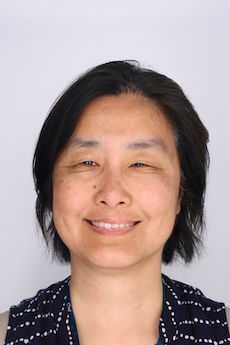Can human communications be represented algorithmically? Can computers facilitate cross-lingual dialogue? Can computers learn new words and usages from exposure to more texts? Professor Rebecca Hwa explores these questions and more in her research on the convergence of linguistics and computer science. She is bringing her expertise in artificial intelligence (AI) and natural language processing (NLP) to GW as the new Chair of the Computer Science (CS) Department!
As a teenager, Professor Hwa loved learning languages and daydreamed of becoming a polyglot; however, she was daunted by their complexity and idiosyncrasies. After stumbling upon her first programming language, BASIC, she was impressed by how computer programs can express complex ideas through just a handful of keywords and rules. She said it was gratifying how much more quickly she could pick up a computer language than mastering a spoken one.
“I still remember my excitement when I saw that my program had learned a simple grammar that generates short English sentences,” Professor Hwa stated. “This confluence of machine learning and human expression continues to inspire me.”
Professor Hwa fits this passion into her career through both her role as Program Director for the National Science Foundation’s Division of Information & Intelligent Systems and her own research work. At NSF, she helped to shape the research landscape by co-leading the national AI Research Institutes Program, which makes long-term investments in AI innovations across multiple sectors and disciplines. In academia, she and her students have focused on different aspects of NLP research, from machine translation to sentiment analysis. She thinks we are in an exciting phase of NLP research with sophisticated models redefining our notions of what is possible.
To expand her research and follow this trend, Professor Hwa is interested in exploring three directions. First, she wants to delve deeper into neural architectures and models to better understand their capabilities and limitations in performing NLP tasks. Second, she wants to continue pursuing interdisciplinary collaborations, such as her recent work on multimodal processing of visual and linguistic inputs for applications in various contexts, such as education and social sciences.
Lastly, she believes NLP should be accessible and beneficial to a broad audience. Thus, Professor Hwa wants to explore the ethical considerations and cultural implications of the technologies we build in addition to improving the accuracy of the core methods. A method to ensure the design of trustworthy AI is to include diverse individuals in their creation to develop algorithms that reflect the values and interests of all people. Promoting diversity in computing is an area Professor Hwa feels strongly about, and she wants to serve as a role model at GW to help the next generation of computer scientists realize their place in the field.
Previously, Professor Hwa served as a faculty member in the Computer Science Department at the University of Pittsburgh since 2003. She embraced the opportunity to join CS at GW because she is convinced of its potential for collaboration and innovation. Her primary goal is to facilitate the CS Department’s growth and to help it thrive by fostering a collaborative community of scholars whose curiosity and innovation drive advances in research and education. One particular initiative she would like to work on is formalizing a mentorship program for early-career faculty members.
Additionally, she aims to collaborate with faculty on enhancing community participation in computing, which entails broadening representation and sparking public discourse on vital societal issues impacted by computing. By nurturing a culture where ideas are shared openly and constructively, Professor Hwa believes we can work toward a united whole that is greater than the sum of its parts.
“Guiding our department during this transformative time is a privilege, and I am most excited about fostering a vibrant community where diverse minds converge to reshape the frontiers of knowledge. Witnessing the growth of early-career scholars under mentorship and engaging in dialogues that bridge computing with pressing societal concerns fuels my commitment to this journey,” said Professor Hwa.


